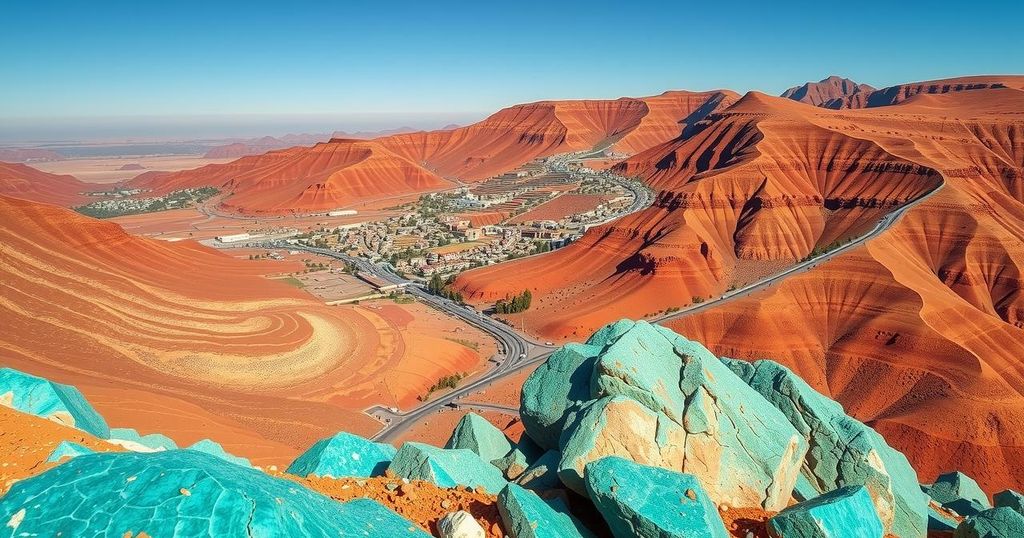Morocco’s Cobalt Frontier: Catalyst Mines Leading a New Era
- Morocco’s cobalt supply could reshape the global battery market.
- Catalyst Mines Inc. has unearthed a significant cobalt deposit at Amassine.
- The discovery promises a larger-scale, low-cost open-pit operation in Morocco.
- A cobalt-sulfate refinery is planned to meet growing battery-grade demand.
- China’s interest in Moroccan cobalt mining underscores a competitive landscape.
Morocco’s Emerging Cobalt Supplies Could Change Markets
As the demand for electric vehicles escalates, the availability of cobalt from Morocco could reshape the global battery landscape. With reports suggesting that Morocco’s cobalt supplies can circumvent the ongoing bottlenecks from the DRC, automakers are eyeing this emerging front as a way to diversify risk and bolster their sustainability narratives. Tracy Hughes, Executive Director of the Critical Minerals Institute, articulates this sentiment perfectly, asserting that a scalable and low-carbon supply from Morocco would meet the needs of manufacturers in North America and Europe who are increasingly keen on ESG-compliant sourcing.
Catalyst Mines Igniting Potential in Cobalt Mining
Catalyst Mines Inc. stands at the forefront of this transformation, having recently unearthed a significant cobalt deposit in the Anti-Atlas region. Their site near the village of Amassine boasts a remarkable mineral composition—10,880 ppm chromium and impressive amounts of nickel and cobalt. Previous mining efforts in Morocco, particularly at Bou Azzer, have produced a limited annual output of around 1,500 tons, keeping the nation well behind the DRC. However, Catalyst’s discovery promises a larger-scale, low-cost open-pit mining operation that could potentially convert an astounding 609 million tonnes of mineralized rock into valuable resources.
Growth Prospects and International Attention on Morocco
Certainly, the ore’s initial discovery offers a tantalizing glimpse, but it is what happens next that will decide the fate of Morocco’s cobalt ambitions. Catalytic projects include a planned cobalt-sulfate refinery aimed at producing substantial battery-grade supplies by 2025, which adds not just value but also local employment potential. Experts predict that cobalt demand could quadruple by 2030, which amplifies the urgency for sustainable sources beyond the DRC. An emerging Moroccan supply chain interlaces perfectly with current commodity trends, placing Morocco as an attractive alternative in an intricate web of international mineral dependencies. China’s increasing activity in this sector, evidenced by their investments in Moroccan refineries, signals the growing competitive landscape and underscores the necessity for Western companies to secure their own sources of critical minerals without reliance on traditional routes.
Strategic Economic Impact and Future of Mining in Morocco
If all goes according to plan, Morocco may not only see a significant boost in its cobalt production but also take a strategic leap in terms of economic development. The promise of responsible, open-pit mining could potentially uplift the under-employed populations in the highlands of Siroua. Local officials draw parallels between the anticipated success of Amassine with the country’s phosphate industry, urging development agencies to foster downstream capacities. Should Catalyst Mines deliver even a fraction of their potential, Morocco’s cobalt output could very well ascend from its current ninth position in the world standings right into the top five, aligning with Washington and Brussels’ calls for a shift towards “friend-shored” critical minerals. In the end, the arrival of a new cobalt powerhouse in Morocco, if achieved, would mark a significant new chapter in the global mining narrative.
In summary, Morocco is on the verge of transforming its cobalt market, with Catalyst Mines emerging as a key player. The discovery at Amassine, along with the planned refinery and international partnerships, could result in a significant shift from traditional mining practices. If successful, Morocco not only sets the stage for sustainable mining but also enhances its position in the global supply chain, emphasizing the importance of alternative sources of cobalt in today’s electric vehicle-driven economy.




Post Comment